Supermassive black hole
Discovery of a supermassive black hole
Black holes are massive objects whose gravitational field is so intense that it prevents any form of matter or radiation to escape, stars, planets, matter, energy, and even light.
Black holes are described by the theory of general relativity. When the heart of the dead star is too massive to be a neutron star, it shrinks inexorably to form this mysterious astronomical object, which is the black hole.
The stellar black holes have a mass of a few solar masses to billions of solar masses. They arise as a result of the gravitational collapse of massive stars residue.
A man already predicted in the 18th century, the existence of dark stars, physicist, astronomer and British geologist John Michell (1724-1793).
In his notes he writes that when a star becomes too massive, it attracts light under the influence of the gravitational force. However, as the calculations give a density of the star corresponding to 18 billion tonnes in cm3, he concludes that it can not exist.
Today, the theory of black holes, states that are objects so dense that its escape velocity exceeds the speed of light. Light can not overcome the gravitational surface and remain trapped.
The theory also defines precisely the intensity of the gravitational field of a black hole. It is such that no particle horizon crossing its border theory, can not escape.
The galaxy NGC 1277, 10 times smaller than the Milky Way, is located about 220 million light-years away in the constellation Perseus. In this galaxy scientists have discovered a cosmic monster, 17 billion solar masses.
The center of the galaxy NGC 1277 is a huge monstrous black hole, so great that scientists have calculated that comprises 14% of the mass of the galaxy and 59% of the mass of the galactic bulge.
Astrophysicists know that there is a black hole at the center of our Milky Way, but our black hole is tiny hand, it is probably not more than 0.1 of the mass of our Galaxy bulb.

Image: The supermassive black hole in the galaxy NGC 1277 is aged about 8 billion years and composed 14% of the total mass of the galaxy. Such a mass challenges current theories describing the formation and evolution of galaxies. NGC 1277 taken by the Hubble Telescope Observatory © Mcdonald, Texas.
Black hole 11 times larger than the orbit of Neptune
Scientists observe every day the space is amazing.
In the small lenticular galaxy NGC 1277 very compact, astronomers Max Planck Society in Berlin, reported in the edition of the journal Nature on November 28, 2012, have discovered the largest black hole ever observed.
This upsets the imagination and undermines what they thought of the formation of galaxies, black holes may exist prior to the formation of galaxies.
Black holes are actually very useful for astrophysicists to explain the spiral shape of many galaxies, it actually takes a very massive object among the stars, but NGC 1277 is an extreme case with unique features.
"This is a galaxy very eccentric," said Karl Gebhardt of the University of Texas at Austin, a member of the team that made the discovery.
"Almost everything is a black hole. This could be the first object of a new class of systems of galactic black holes.".
Gebhardt and his colleagues at the McDonald Observatory have calculated the mass of individual black holes. Researchers have developed an animation of the star formation in this galaxy far, they behave as objects whipped around the center to avoid falling into it. Black holes have gravity so powerful that they distort and twist the space around them.
But how to find black holes, since they absorb everything that happens next?
A black hole attack a star must be analyzed observing the spectrum of the star still visible. If a star rotates around a black hole, it should draw gas from the star by stretching.
Astronomers observe the stars around a black hole possible by selecting those that emit X-ray outburst optical light and radio.
While they find when a star rotates around an invisible object, the light shifts from red to blue and vice versa. From the speed of this shift, physicists calculate the size of the object.
The evidence accumulated over time and today there is no doubt, scientists believe that black holes exist.
Many indications that the center of most of the galaxies is occupied by a black hole.
However, this gigantic black hole in the galaxy NGC 1277 occupies little space huge corresponding to 11 times the orbit of Neptune or 50 billion miles, which gives an idea of its mass.
Scientists have also used several different instruments to measure this monster, so they thought they had made a miscalculation.

Image: November 28, 2012 - Galaxy NGC 1277 is located in the constellation of Perseus, it is the small galaxy in the center of the image pointed to by the arrow.
Compared to all the other galaxies around NGC 1277 is very compact and flat.
Black hole of the Milky Way
The Milky Way is the central region of our galaxy.
On the infrared image below shows against the exact center of our galaxy, known as the Central Molecular Zone and purple arc radio galactic center.
A number of emission nebulae are visible through the massive young stars that illuminate the interior.
Like almost all galaxies, our galaxy lodge at its center, a black hole. This black hole of several million solar masses, is called Sgr A. The galactic center is also home to the region of star formation, the most active of the galaxy. Observations in Namibia, with the HESS telescope has revealed the presence of very energetic gamma rays from the galactic center.
These gamma rays are produced by the collision of protons at very high energies with protons at lower energies. It can occur at this time, a reaction in neutral meson decays, produce gamma photons.
These photons when they collide with atoms in the Earth's atmosphere, producing an avalanche of all types of particles, one speaks of cosmic ray showers.
Image: On this image, we see the exact center of our galaxy, known as the Central Molecular Zone and purple arc radio galactic center.
Besides its scientific interest, this image won first prize in the photographic AUI / NRAO in 2008.
Credit: A. Ginsburg (U. Colorado - Boulder) et al. SPMO team, team GLIMPSE II.
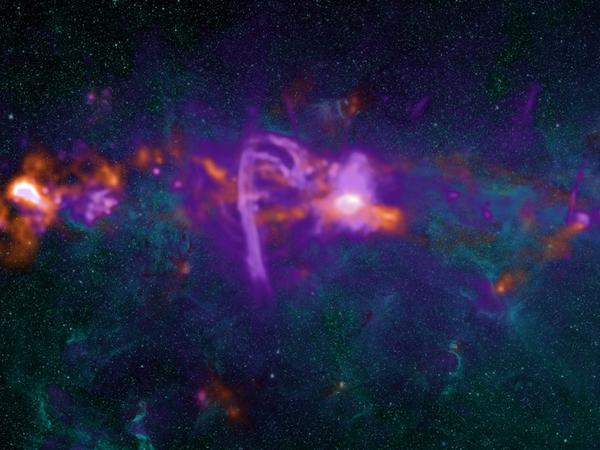
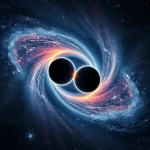 Gravitational Waves: Vibrations in the Cosmic Fabric
Gravitational Waves: Vibrations in the Cosmic Fabric 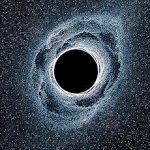 Primordial Black Holes: The Invisible Vestiges of the Young Universe
Primordial Black Holes: The Invisible Vestiges of the Young Universe 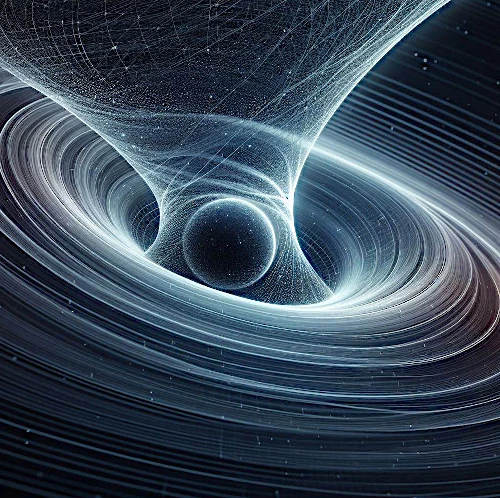 The curvature of time, a non-intuitive concept!
The curvature of time, a non-intuitive concept!
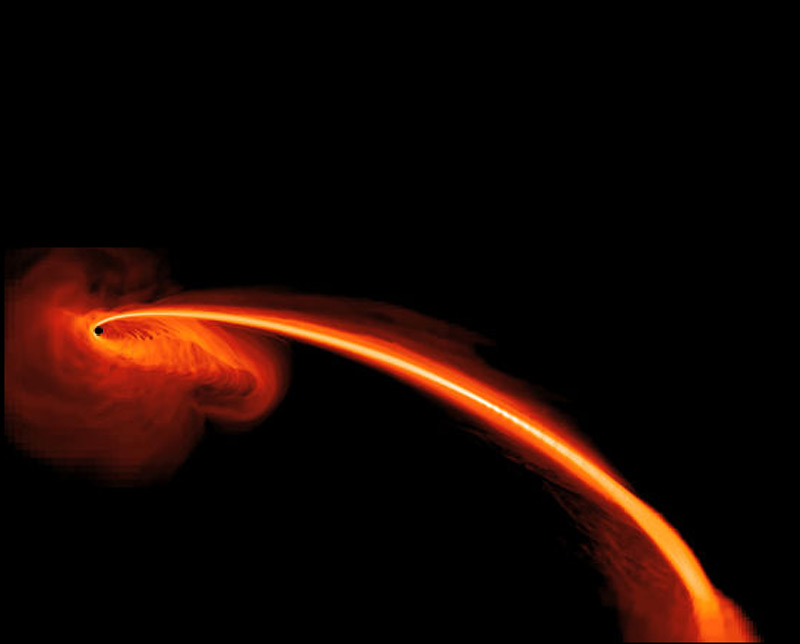 Escape or escape speed
Escape or escape speed
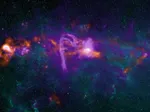 Sagittarius A: Cosmic Monster Lurking at the Center of Our Galaxy
Sagittarius A: Cosmic Monster Lurking at the Center of Our Galaxy
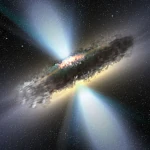 On the trail of invisible black holes: gravitational impact and effects on nearby stars
On the trail of invisible black holes: gravitational impact and effects on nearby stars
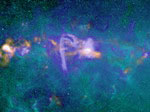 Central area of the Milky Way
Central area of the Milky Way
 The first image of a black hole
The first image of a black hole